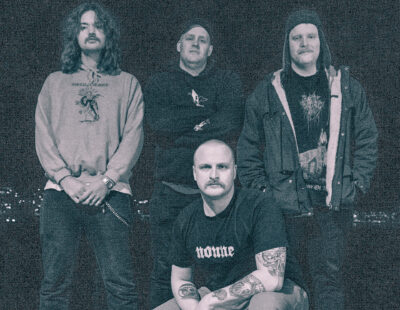Welcome to Tales From the Metalnomicon, a twice-monthly column delving into the surprisingly vast world of heavy metal-tinged/inspired literature and metalhead authors…
Dean Swinford is very likely the first and almost certainly the last author in the history of Western literature to pen an epigraph comprised of equal parts Shakespeare (“Is not lead a metal heavy, dull and slow?”) and Cathedral (“Angels have no pity/Their wings have turned to stone”), and the fact that he chooses to do so explains quite a bit about his very fine novel, Death Metal Epic (Book One: The Inverted Katabasis), a smart, funny tome following the (mis)adventures of an early nineties Florida death metal band called Valhalla that morphs into an experimental “mash-up of Thergothon and Dead Can Dance” after its debut album Thrones of Satanic Domination fails to catch fire.
Thankfully, when it comes to extreme music Swinford is knowledgable sophisticate, not a preening, condescending shock value tourist — which is to say, rest assured, if it existed, Death Metal Epic would carry the Metal Militia Seal of Approval.
“I wanted to write about Florida death metal in the early nineties because of its personal significance and I suppose out of a sense of nostalgia,” Swinford tells Decibel. “I’m from Miami and grew up listening to all of the bands that I mention in the book. As much as the book is about metal, it is also about the experience of growing up and looking back on the places you have lived. I have enough distance that I can look on that period more clearly; it’s far enough away, though, that writing about places where I used to live, like Miami and Gent, allows me to re-experience them.”
The Metalnomicon recently invited Swinford to discuss the aural inspirations and accompaniments to his death metal fantasy…
The first part starts with a quote from Death’s “Symbolic.” That album is a little bit further into the nineties than the action of the book, but it’s something I listened to a lot while writing. I picked it for the book, though, because it seems like that song is talking about the same kind of period in life that I’m writing about — those late teen/early twenties years where things are changing so much, but they’re also not changing fast enough. Or you feel like you’ll never get to the place you really want to be. That’s kind of where David is at the beginning of the book. He is barely into his twenties, but he wonders if the best times have already passed him by.
The music that influences the first part of the book includes other Death albums from that period, with Human as the most influential. They recorded it in Miami. One of my friends, who edited a zine and ran the metal section at Yesterday and Today Records, knew those guys and got to go to some of the recording sessions. If you read the liner notes to the most recent reissue, Paul Masvidal from Cynic writes about places in Miami, like Coconut Grove and Old Cutler Road, that anybody who grew up there knows well. Parts of the city that aren’t that far from places I describe in the book, like Merrie Christmas Park and Coral Gables.
When I was coming up with Valhalla, I was thinking of bands from that era that made solid music, but just kind of disappeared. Stuff like Resurrection’s Embalmed Existence or Disincarnate’s Dreams of the Carrion Kind.
The second part of the book revolves around Katabasis and their ill-fated tour. That part of the book starts with a quote from a song on Cathedral’s Forest of Equilibrium. It’s paired with a quote from Shakespeare that calls lead “a metal dull and heavy.” Both quotes refer to falling, descent. The reference to lead connotes as well the underworld. In classical myth, Pluto’s chariot is made of lead. The quotes are meant to refer to the plodding, heavy sound of doom and the idea of the inverted katabasis, a phrase that means a journey out of the underworld, but which I also like because it sounds like something you might hear in the chorus of a Krisiun song.
The two other doom albums I’m listing as most influential to this part of the book are by Thergothon, Stream From the Heavens, and Disembowelment, Transcendence Into the Peripheral. The Disembowelment album still has some blast beats and speed-driven passages, but they more than make up for that with the ambient/doom mix that pervades most of the songs. Thergothon is maybe less experimental in their instrumentation, but the entire record maintains the same kind of contemplative atmosphere that Juan and David create as Katabasis. I still listen to Thergothon at least once a week, and I’m a big fan of more recent bands, like Mournful Congregation and Skepticism, that take a similar approach.
The book also shows the influence of features common to a large majority of death metal albums in some structural ways. I have a few chapters that I’ve marked off as “metametal.” That means they are about the genre itself, or they’re there to simulate in writing some of the features of a death metal album. The first chapter, for example, plays with a lot of the conventions of death metal intros, generally ominous soundscapes meant to sound like dungeons or nocturnal forests, to introduce the series and its thematic concerns. The intro also tries to show some of the parallels between death metal and myth, so it describes something like what you hear at the beginning of Bolt Thrower’s Realm of Chaos while also serving as a kind of classical invocation. One of the other chapters like that includes the liner notes to the Katabasis album. Like any self-respecting death metal album, it is made up of extensive “thank you” lists. Most of the metal bands I listened to while writing are included in David’s list, and most of the non-metal stuff I like is in Juan’s list.
Dean Swinford will be a guest on WXPU on Saturday, June 29 from 9 AM until noon (EST).







